Selling digital products is a smart way to earn money online.
Creators, bloggers, entrepreneurs, writers, and any other professionals can sell digital products and generate significant revenue. To sell digital products online, you need a reliable platform. It must be secure and user-friendly.
There are many digital products selling platforms out there, each comes with its long list of pros and cons. But don’t worry, we’ve got you covered.
In this post, we will share our list of the 10 best platforms to sell digital products. Each of these platforms offers the best set of features to sell digital products.
Let’s begin.
10 Best Platforms to Sell Digital Products
The best platforms to sell digital products in 2026 are…
EzyCourse
Shopify
Etsy
Creative Market
Podia
Thinkific
Nas io
Gumroad
Sellfy
Payhip
SendOwl
Let's explore these platforms in detail.
1. EzyCourse (Best for Coaching, Courses, Communities, Memberships, and Digital Downloads)

EzyCourse is an all-in-one platform for creators, coaches, and entrepreneurs to simplify creating, selling, and delivering online courses, products, and services.
You can create physical or digital products and sell them on the same platform. EzyCourse facilitates engagement and earnings through a marketplace and an active, rewarding community.
The platform is specifically designed to sell digital products, including online courses, memberships, ebooks, digital downloads, services, and more. It offers various features to create and sell these digital products.
It includes a user-friendly drag-and-drop builder and supports email marketing and automation tools for managing sales, promotions, and more.
You can set up custom domains and branded storefronts. Payment processing is built in with Stripe, PayPal, RazorPay, and other leading payment gateways. Overall, EzyCourse comes as one of the best platforms to sell digital products in 2026.
Key Features
Course and Content Creation: EzyCourse offers various lesson types for creating your courses and content, including drip-scheduled lessons, videos, and audio.
Sell a Variety of Digital Products: EzyCourse allows you to sell courses, memberships, digital downloads, and more.
Organize with Custom Categories: You can easily categorize your products to improve search and user experience.
Advanced Analytics: You can track sales, customer behavior, and performance to make smarter product decisions.
Upsell Add-ons: With EzyCourse, you can create up to 20 upsell add-ons per product, useful for increasing your income.
Email Automation: EzyCourse email automation helps you nurture your leads, promote your products, and keep your customers engaged.
Website Builder: You can build your beautiful, branded Website for your online business with the EzyCourse site builder.
Affiliate Program: You can create an affiliate program for your digital products to influence others to help you expand your reach and boost your sales.
Pros
EzyCourse prioritizes accessibility, ensuring that individuals, irrespective of their coding expertise, can navigate and utilize the platform with ease.
EzyCourse’s affordability makes it suitable for businesses of all sizes.
EzyCourse combines features from popular WordPress plugins, making it an all-in-one solution to create an online course.
Sell numerous digital products, including audio/video, ebooks, PDF, zip files, etc., as well as physical products.
You can keep 100% of your earnings as there’s no hidden cost or transaction fee.
Get a branded mobile app for Android and iOS, allowing you to host your content and engage students.
You can connect with your students or buyers through a customizable community feature.
You can build and manage membership sites for exclusive content and access with tiered pricing, benefiting from passive income.
You can take advantage of analytics and marketing tools to monitor performance and increase sales.
There are different monetization and payment options to enable multiple revenue streams.
EzyCourse offers lots of sales and marketing features like lead generation, email automations, coupons, promotions, upsells, etc.

Cons
EzyCourse does not offer a free plan.
EzyCourse has a learning curve for users unfamiliar with online course platforms.
Pricing

EzyCourse offers four pricing plans to sell digital products.
1. Essential: $59/month (billed annually)
2. Pro: $139/month (billed annually)
3. Unlimited: $199/month (billed annually)
4. Elite: $299/month (billed annually)

2. Shopify (Best for Digital + Physical Products)

Shopify is a powerful e-commerce platform suitable for businesses of any size, including those selling digital products. Shopify has a suite of features that includes eCommerce, social eCommerce, and simple shopping with single-click-to-buy buttons.
It is the most modern eCommerce platform in the world, and it allows you to create an eCommerce store for both digital and physical goods.
Although largely known for physical product sales, its app store also offers some great digital downloads for selling ebooks, online courses, graphic design templates, and more. It’s placed on the list because it has helpful customer support, a broad feature set, and the potential to scale with growth in business.
Key Features
Fully Customizable Storefronts: Not only does Shopify support various online stores, but it also allows every user to create a distinct store that completely resonates with their brand. Various themes and design customizations in Shopify allow showcasing your digital products in multiple pleasing formats.
Built-in Payment Processing: Shopify lets you accept payments from around the world using Shopify Payments or third-party providers. It makes the checkout process smooth for customers and easier for your bookkeeping.
Abandoned Cart Recovery: You can win back lost sales with automated email reminders sent to customers who left items in their carts- perfect for boosting conversions and revenue.
Marketing Tool Integration: Shopify gives you the power to run email campaigns, connect with social media platforms, and engage your audience- all from one central dashboard.
Pros
Manage physical and digital products in a single system, with easier inventory tracking and order management.
It is an automated delivery process where digital goods are delivered to your customers through email (without the need for you to intervene). There’s also a secure way for your customers to get a download link in case they have misplaced the email.
Sellers can sell a product in a variety of formats or versions (for example, different resolutions, file types, or package sizes) under one listing, ensuring the product reflects their vision without the need to create multiple listings.
With Shopify, once a digital product is updated, sellers can push the new version to customers who’ve already bought it, getting them access to the most up-to-date item and offering them a better experience.
Enjoy 24/7 support across multiple conversation types so you are never left waiting for a response.
Use the features included and seamlessly add marketing functionalities in order to get a bigger audience and make more sales.
As you grow, you can scale up with Shopify, which has several pricing tiers and features to help accommodate larger sales volumes.
Cons
A non-transactional monthly fee will be charged per account, which could pose problems for emerging firms or companies with low sales or a small selection of products.
A simpler platform might be sufficient if you have a limited range of digital products.
Transaction fees are applicable except for the usage of Shopify Payments.
Pricing
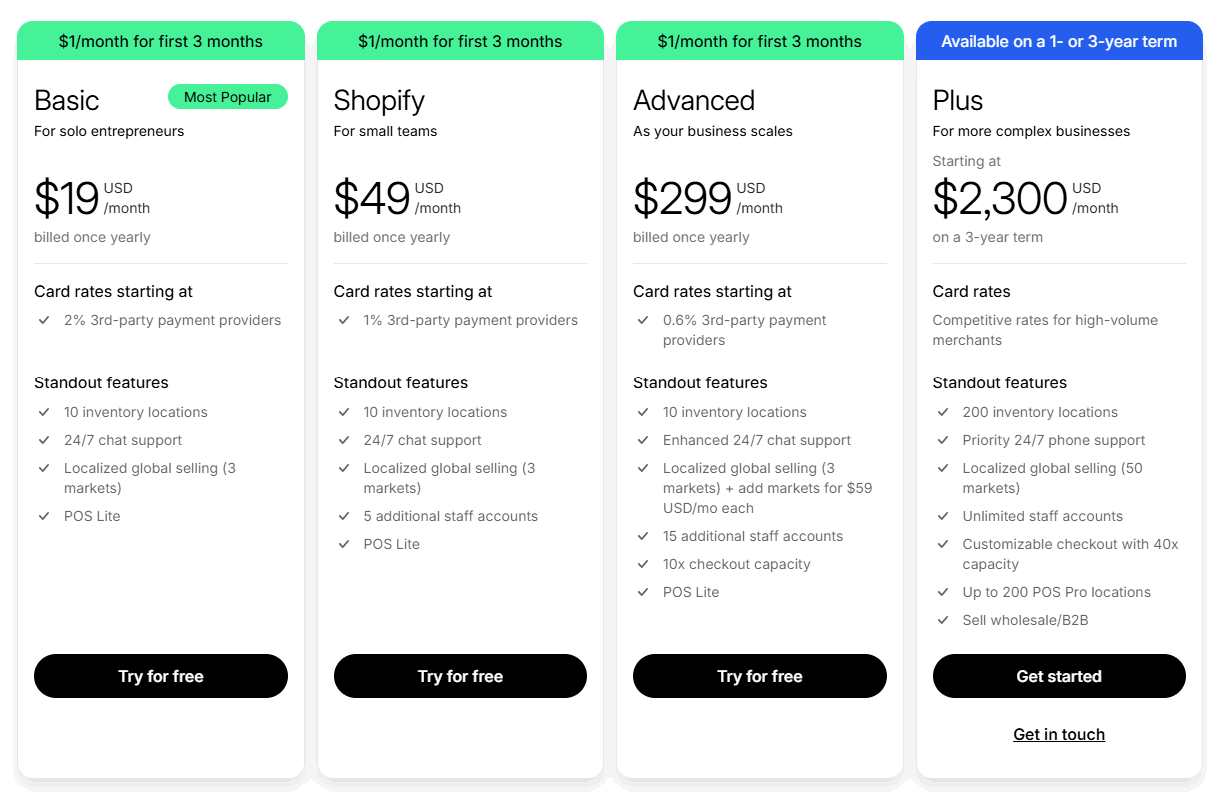
At the time of writing this blog, Shopify is offering a special pricing of $1/month for the first three months. After that, you can enjoy one of its four pricing plans.
1. Basic: $19/month (billed annually)
2. Grow: $49/month (billed annually)
3. Advanced: $299/month (billed annually)
4. Plus: From $2,300/month with a 3-year contract
3. Etsy (Best for Digital Art, Printable Templates, and Design Assets)
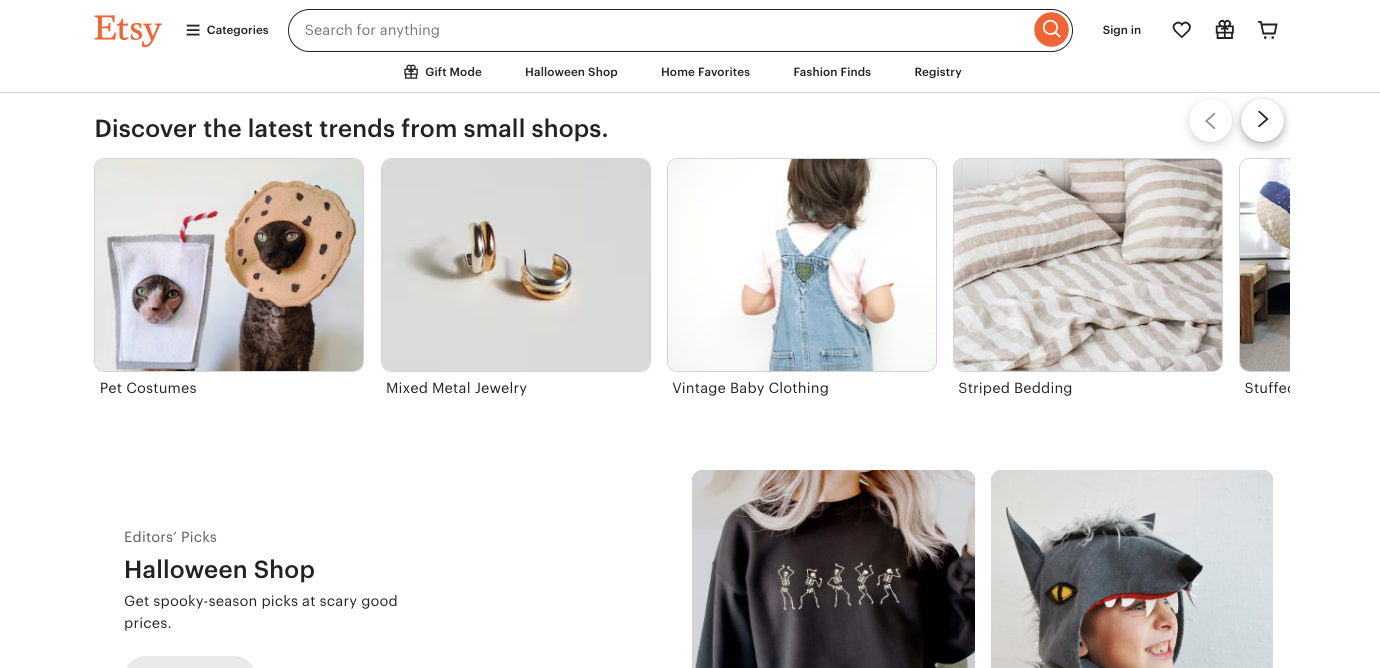
Etsy is a popular global marketplace, widely known for handmade and vintage items. But it's also a practical platform for selling digital products, making it a useful additional sales channel for Shopify store owners and artists selling handmade goods.
If you're already creating printables, patterns, digital artwork, design templates, or similar digital creations, Etsy offers a ready-made audience.
Key Features
Easy Digital Delivery: Etsy makes it easy for you to deliver digital files automatically to your customers after they make the purchase.
Trusted Reviews: The reviews on Etsy help build trust and social proof, contributing to more sales. Positive reviews can significantly improve your product’s visibility.
Systemized Product Groupings: Etsy, being a marketplace with categories, helps buyers locate items of interest, thereby making your listings visible to the correct market.
Mobile App for Sellers: You can effortlessly manage your shop, listings, and orders from anywhere with the Etsy seller app.
Pros
Reach millions of potential customers already browsing Etsy, significantly reducing the marketing effort needed to build an audience from scratch.
Benefit from Etsy’s reputation, which builds credibility with customers.
Quickly and easily upload products without technical complexity.
Etsy handles payment processing, making transactions smooth and secure for both sellers and buyers.
Cons
Costs can add up, impacting overall profit margins.
A crowded marketplace can make it difficult to stand out without strong branding or marketing.
Sellers have minimal control over shop layout and branding.
Features and tools for digital product sellers are somewhat limited compared to platforms tailored for digital content.
Pricing
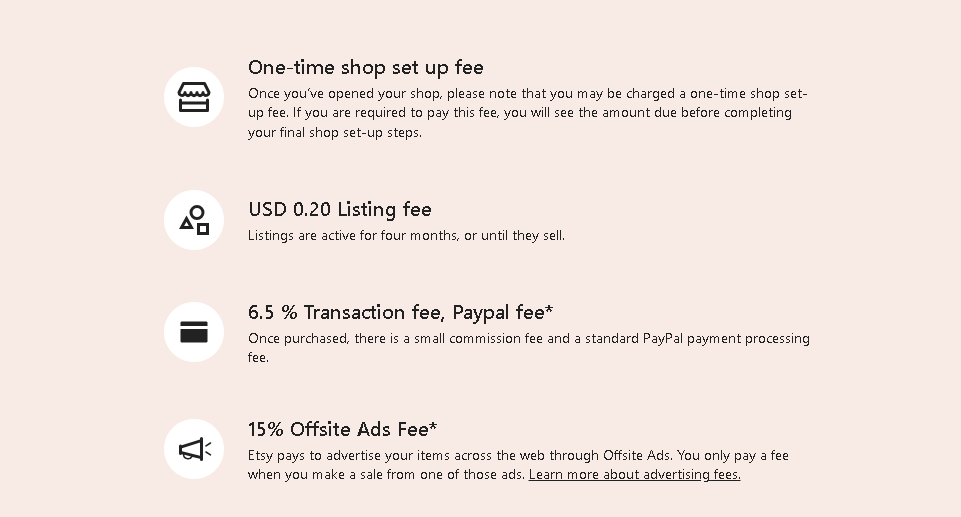
Etsy doesn’t offer any pricing plans. It just takes listing and transaction fees.
$0.20 per listing.
6.5% commission fee and
payment processing fee

4. Creative Market (Best for Selling Fonts, Graphics, Themes, Stock photos, and Templates)
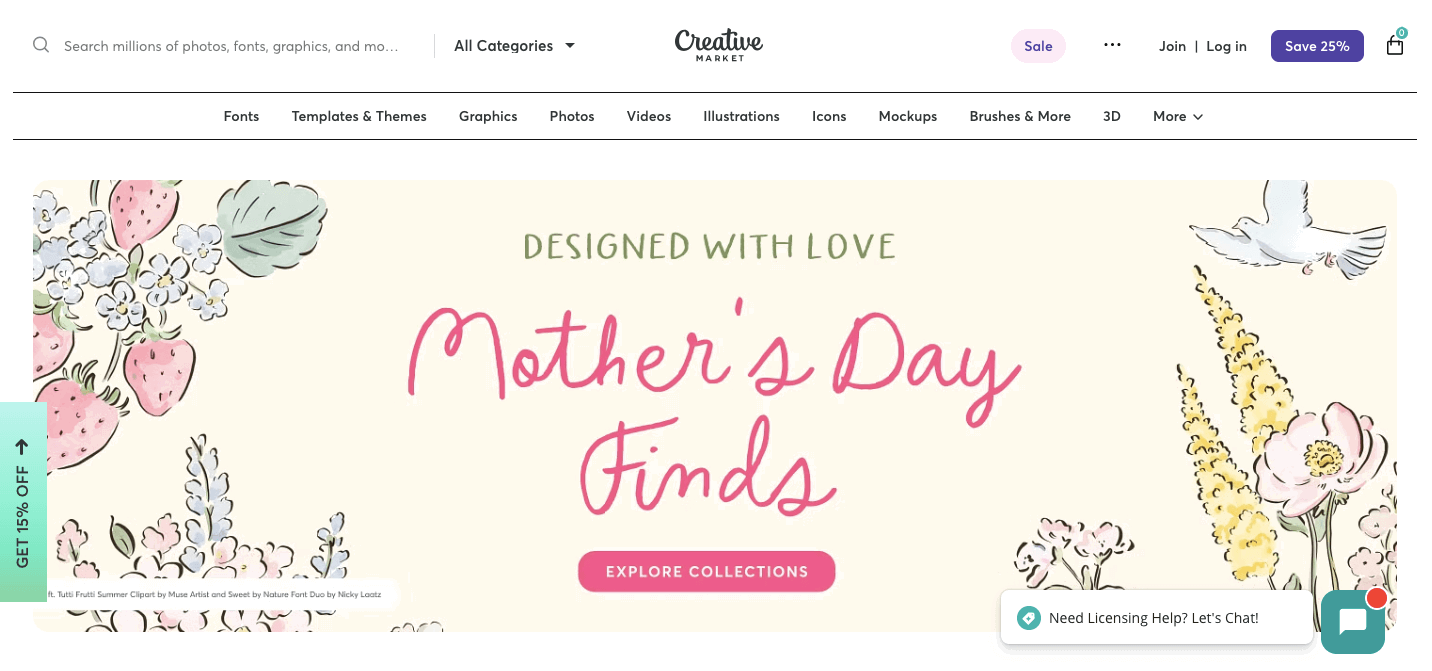
Creative Market is a top marketplace for digital design products. It’s ideal for designers, illustrators, and creatives. You can sell fonts, templates, themes, illustrations, photos, graphics, brushes, and more.
The platform has a large, built-in customer base. It handles product hosting and delivery for you. Sellers get their own storefront with branding options.
Creative Market makes it easy to upload and manage products. It offers analytics to track your performance. Payments are handled securely and reliably. It’s a trusted choice for digital artists in 2026.
Key Features
Marketplace Model: Creative Market gives you a ready-made platform to sell graphics, templates, fonts, themes, and more. There is no need to build an audience from scratch.
Huge Customer Base: You get access to millions of creative buyers actively searching for high-quality digital assets like yours.
Easy Shop Setup: You can quickly upload and manage your products without the hassle of building your own website.
Seller Dashboard: Creative Market provides powerful tools and analytics so you can track your performance and optimize your listings with ease.
Pros
Large and active marketplace with strong organic traffic.
Ideal for designers, photographers, and digital creatives.
Free to join and start selling.
Promote products through newsletters and curated collections.
Sell to a worldwide audience without handling transactions directly.
Cons
Takes a percentage of each sale, reducing your profit margin.
No ability to customize storefronts deeply or collect customer emails.
Many sellers and products make standing out a challenge.
Pricing
Initially free to sell on Creative Market.
5. Podia (Courses, Digital Downloads, and Webinars)
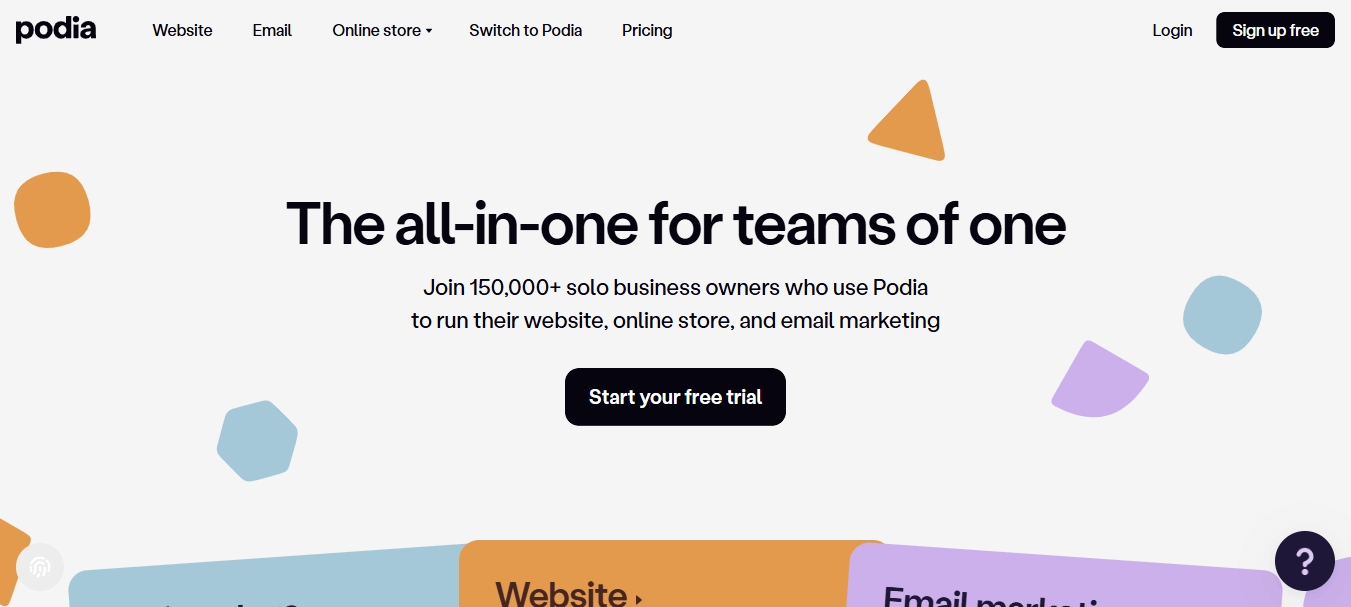
Podia is an online course platform for creators and educators. You can sell courses, digital downloads, webinars, and memberships. The interface is clean and easy to use.
It's built-in email marketing tools help you reach your audience. You can host videos, drip content, and offer bundles. Podia allows full storefront customization without coding.
Payments are handled through Stripe and PayPal. It also includes live chat to connect with customers. Everything is designed here to keep your workflow simple and streamlined.
Key Features
Comprehensive Solution: You can sell everything from digital downloads and online courses to memberships and webinars, all in one centralized platform.
Built-in Email Marketing: Podia lets you run email marketing campaigns, send newsletters, and set up automated sequences to stay connected with your audience.
No Transaction Fees: You keep 100% of your earnings on paid plans- no hidden fees eating into your profits.
Custom Storefront: You can design a clean, professional-looking storefront that reflects your brand without needing a web designer.
24/7 Customer Support: Podia has dedicated customer support around the clock, so you're never stuck waiting for help.
Pros
Clean, intuitive dashboard suitable for beginners.
Sell courses, eBooks, webinars, and bundles in one place.
Create memberships and offer direct messaging.
No limits on the number of products or customers.
Accept payments easily with Stripe or PayPal.
No technical knowledge needed to launch and manage.
Cons
Fewer customization options compared to advanced platforms.
Smaller third-party app ecosystem than some competitors.
Lacks advanced automation and segmentation features.
Only available as a free trial, then requires a paid subscription.
Pricing
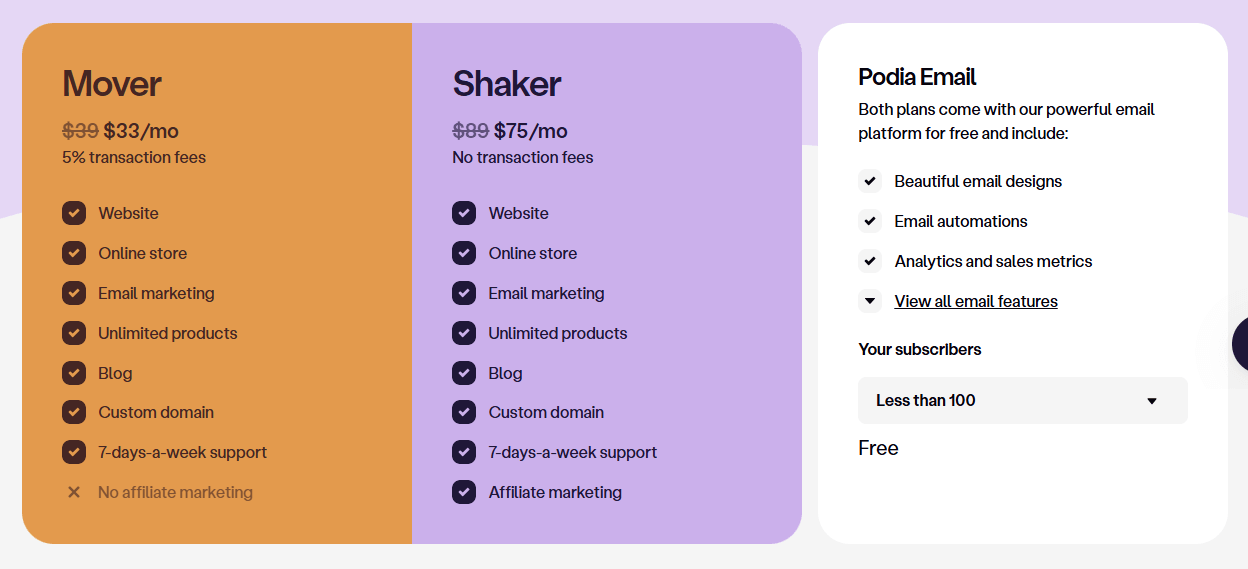
Podia offers two pricing plans. You’ll get free access to the Podia Email platform for free with both plans.
1. Mover: $33/month (billed annually)
2. Shaker: $75/month (billed annually)

6. Thinkific (Best for Online Course Businesses and Educators)
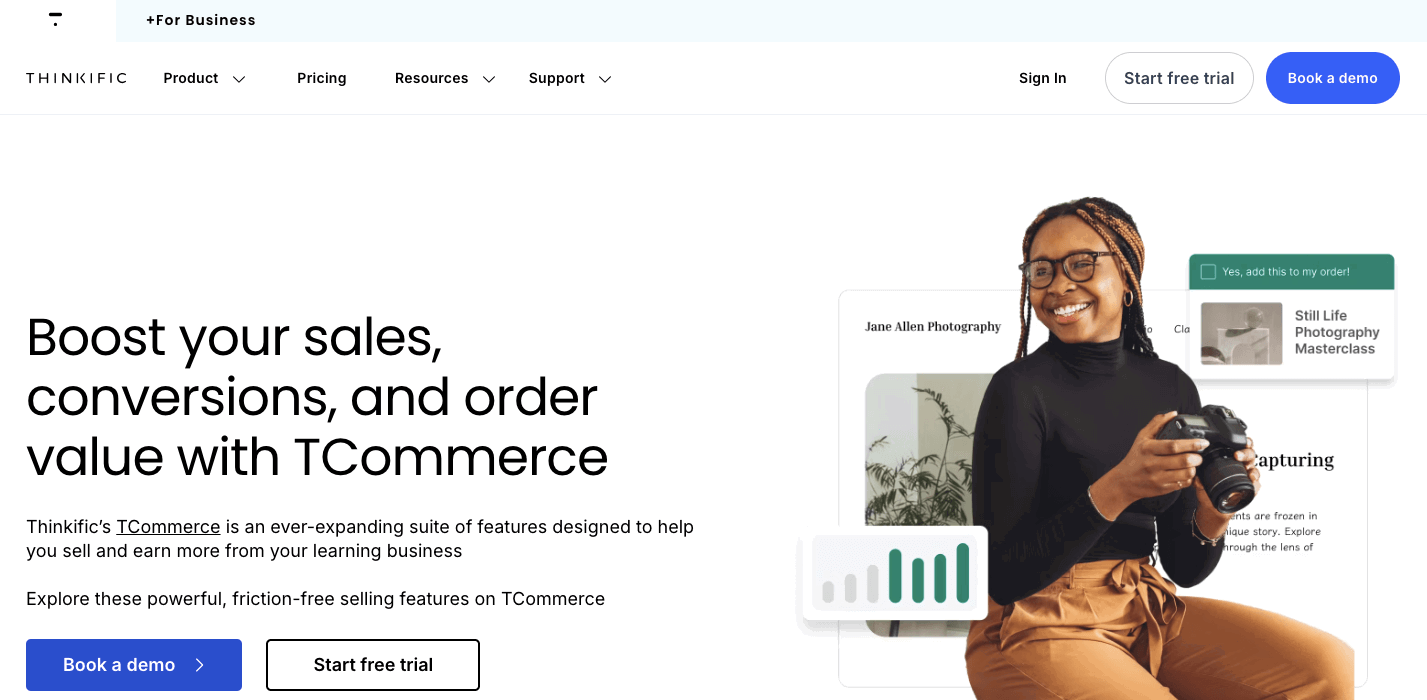
Thinkific is a robust online course platform designed for selling online courses. Though other platforms might have a larger variety of digital products, Thinkific is built for creating and delivering captivating learning experiences.
Thinkific offers a full range of features, from a course builder with simple drag-and-drop functionality to integrated sales/marketing capabilities.
You can control what you teach, how you price, and who can access your material, and there are no transaction fees. Its features allow you to track student progress, understand their engagement, and tailor your content accordingly.
A variety of payment methods make it easy for students from all over the world to get started.
Key Features
Drag-and-Drop Course Builder: You can create professional-looking courses with ease- no coding needed, just intuitive drag-and-drop tools.
Customizable Learning Environment: Thinkific lets you brand your course site so it matches your existing style and builds a seamless experience for your learners.
Marketing and Sales Tools: You can promote your courses, run campaigns, and handle sales right from your Thinkific dashboard.
Student Progress Tracking: Thinkific helps you monitor learner activity so you can support students better and improve your content.
Multiple Payment Options: You can offer your students the flexibility to pay how they prefer, with a variety of payment methods built in.
Pros
Enjoy a higher percentage of your income with no transaction fees.
Grow your online course business without limitations.
Build a fully fledged course with ease.
Get assistance from a representative when needed and resolve the issue in no time.
Cons
Thinkific has a subscription-based plan.
This does not work well for selling printables, ebooks, or other non-course digital items.
Higher-paid subscriptions have the most advanced features, like memberships and communities.
Pricing
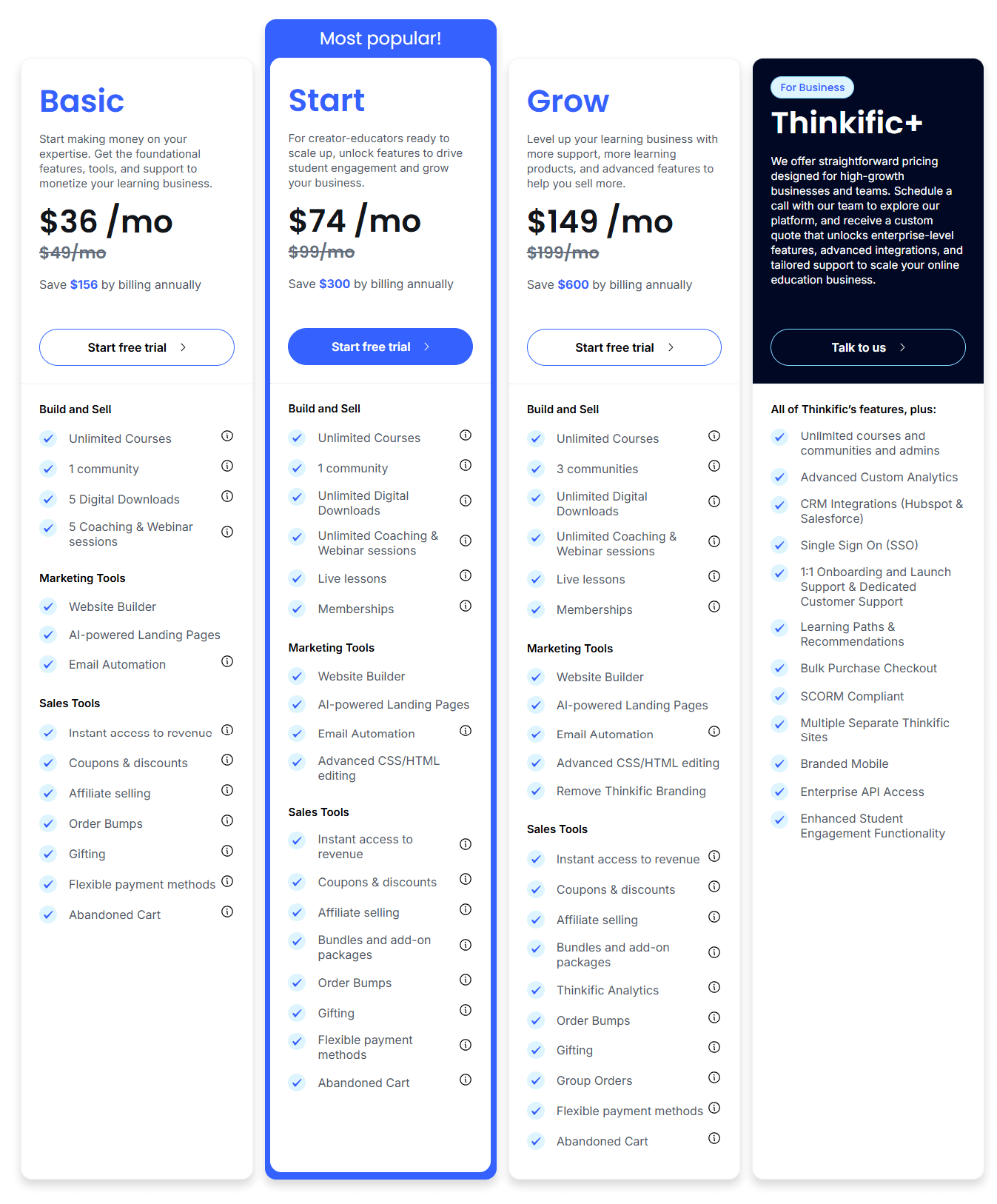
Thinkific offers four pricing plans.
1. Basic: $36/month (billing annually)
2. Start: $74/month (billing annually)
3. Grow: $149/month (billing annually)
4. Thinkific+: Custom pricing

7. Nas.io (Best for Memberships, Events, and Access-Based Digital Products)
Nas.io is a platform designed for creators who monetize digital products through memberships, paid access, and recurring offerings rather than one-time downloads alone. It enables creators to package digital products alongside exclusive content, live sessions, events, and gated resources in one place.
Creators can sell access to premium content, digital resources, and experiences while maintaining ongoing engagement with their audience. This model works well for creators who deliver value continuously through updates, live interactions, or time-based content instead of static products.
With Nas-io, creators can set up paid memberships, manage access tiers, and sell digital offerings tied to subscription or event-based models. It is especially suitable for creators who want predictable revenue streams supported by recurring access rather than single transactions.
The platform supports payment collection, access control, and creator-led experiences, making it a strong option for selling evolving digital products such as workshops, exclusive libraries, and member-only content.
Key Features
Membership-Based Monetization: Nas-io allows creators to sell paid access to exclusive content, resources, and experiences on a recurring basis.
Event and Session Hosting: Creators can organize and monetize live events, workshops, and sessions as part of their digital offerings.
Tiered Access Control: You can create different access levels for members based on pricing or content availability.
Integrated Payments: The platform supports seamless payment collection for memberships, events, and digital access.
Audience Engagement Tools: Built-in tools help creators interact with members, share updates, and deliver ongoing value.
Creator-Focused Dashboard: Manage members, payments, and content access from a centralized dashboard.
Pros
Nas.io is well-suited for creators focused on recurring revenue and long-term audience engagement.
It supports access-based digital products instead of limiting creators to one-time sales.
The platform simplifies selling memberships, events, and exclusive content without complex setup.
Creators can bundle digital products with live or time-based experiences.
Payment handling and access control are built directly into the platform.
It is scalable for creators growing from small audiences to larger paid memberships.
Cons
Nas-io is not ideal for creators who only sell one-time digital downloads.
Customization options for standalone storefronts may be more limited compared to full website builders.

Pricing
Nas-io offers pricing plans based on creator needs and monetization models. Pricing may vary depending on features, scale, and usage.
8. Gumroad (Best For Indie Creators And Simple Digital Downloads)
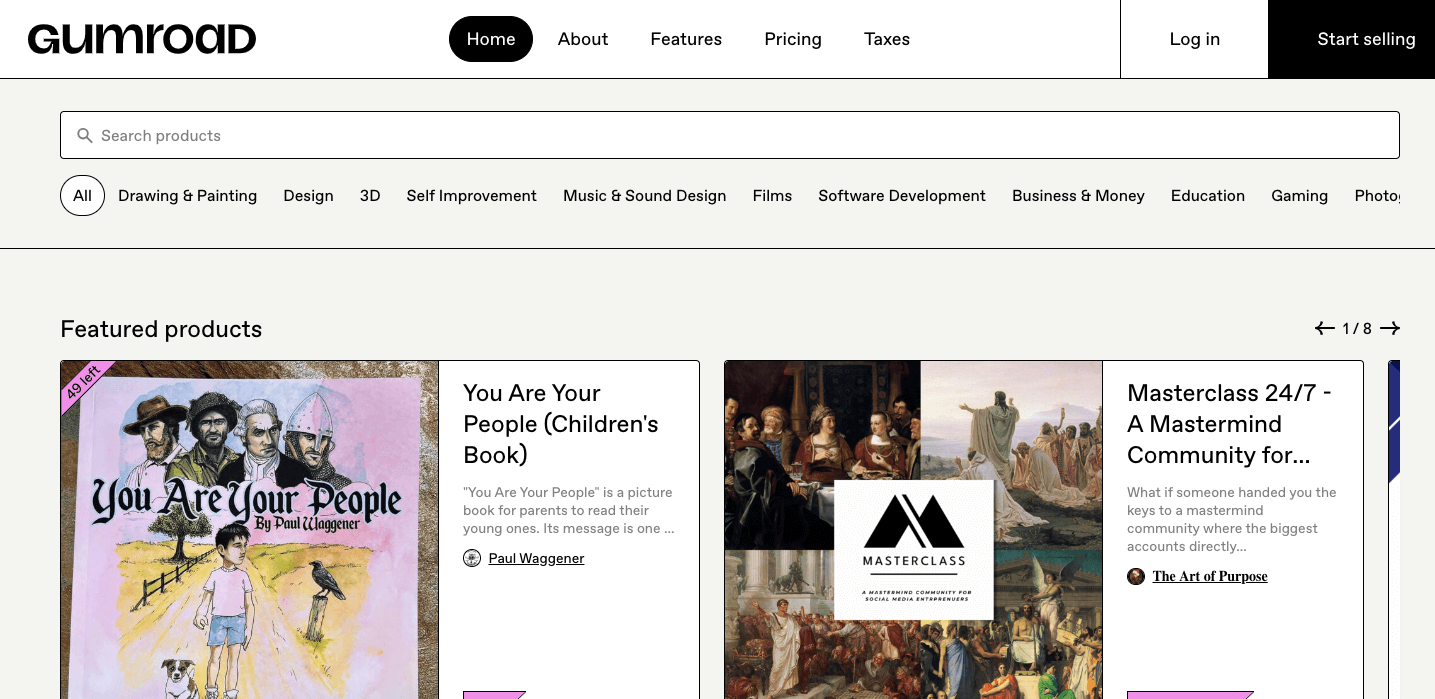
Gumroad is a simple and popular platform for selling digital products. It’s perfect for creators, writers, and artists. You can sell ebooks, software, downloadable patterns, courses, memberships, and premium video tutorials. The setup procedure is brief and beginner-friendly.
Gumroad handles file delivery and payments automatically. You can customize your product pages easily. It supports pay-as-you-go pricing and discount codes.
You can also build email lists through the platform. Analytics help track your sales and customer behavior. Gumroad is great for solo creators who want a hassle-free solution.
Key Features
No Monthly Fees: You only pay when you make a sale. It’s perfect if you're just getting started or have a variable income.
Built-in Affiliate Program: Gumroad lets you grow your audience through affiliate partners who earn commissions for driving sales.
Customizable Checkout: You can keep your brand consistent with a checkout experience that looks and feels like your own.
Audience and Analytics Tools: Gumroad gives you clear insights into who’s buying, how they're engaging, and what’s working. So, you can make smarter decisions.
Pros
Ideal for creators with little to no technical experience.
Set your shop in minutes with Gumroad's intuitive dashboard and easy-to-use system- listing products and customizing your storefront is straightforward.
Sell directly to your audience with enhanced customer relationships and engagement.
Make international selling easier by meeting the required tax standards for each region.
Easily sell ebooks, courses, software, designs, audio, photography, and more. Gumroad is optimized for digital goods.
Cons
Gumroad fees are more than those on some platforms, and this can affect the profit margins on high-volume sales.
Available with fewer design and brand options compared to self-hosted or more flexible e-commerce platforms.
Does not have an “all-in-one” marketing platform, so you need to depend more on 3rd party marketing promotion tools.
Pricing
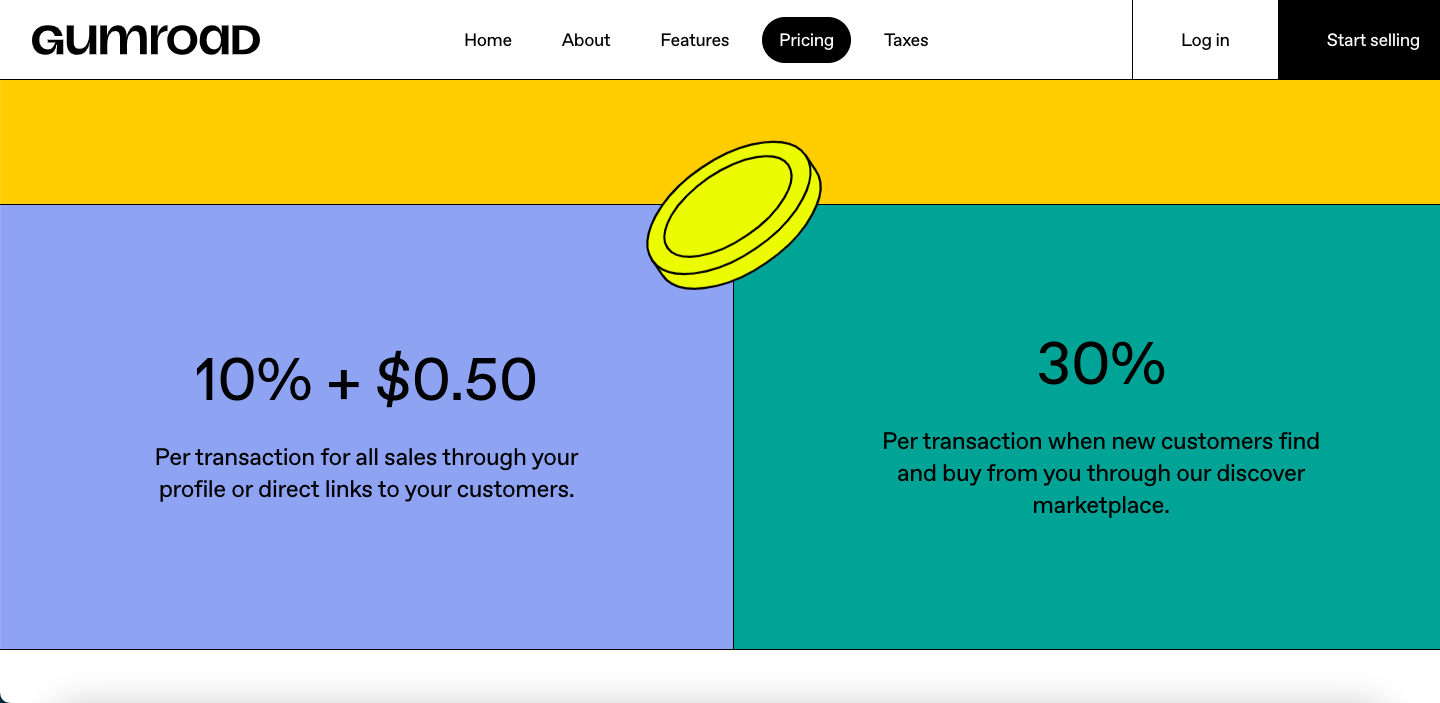
Gumroad charges you in two different ways.
A 10% fee plus $0.50/transaction applies to all sales through your profile or direct links.
A 30% commission per transaction when a user buys your product through the Gumroad Discover marketplace.

9. Sellfy (Best For Selling Digital + Physical Products With Built-In Marketing)
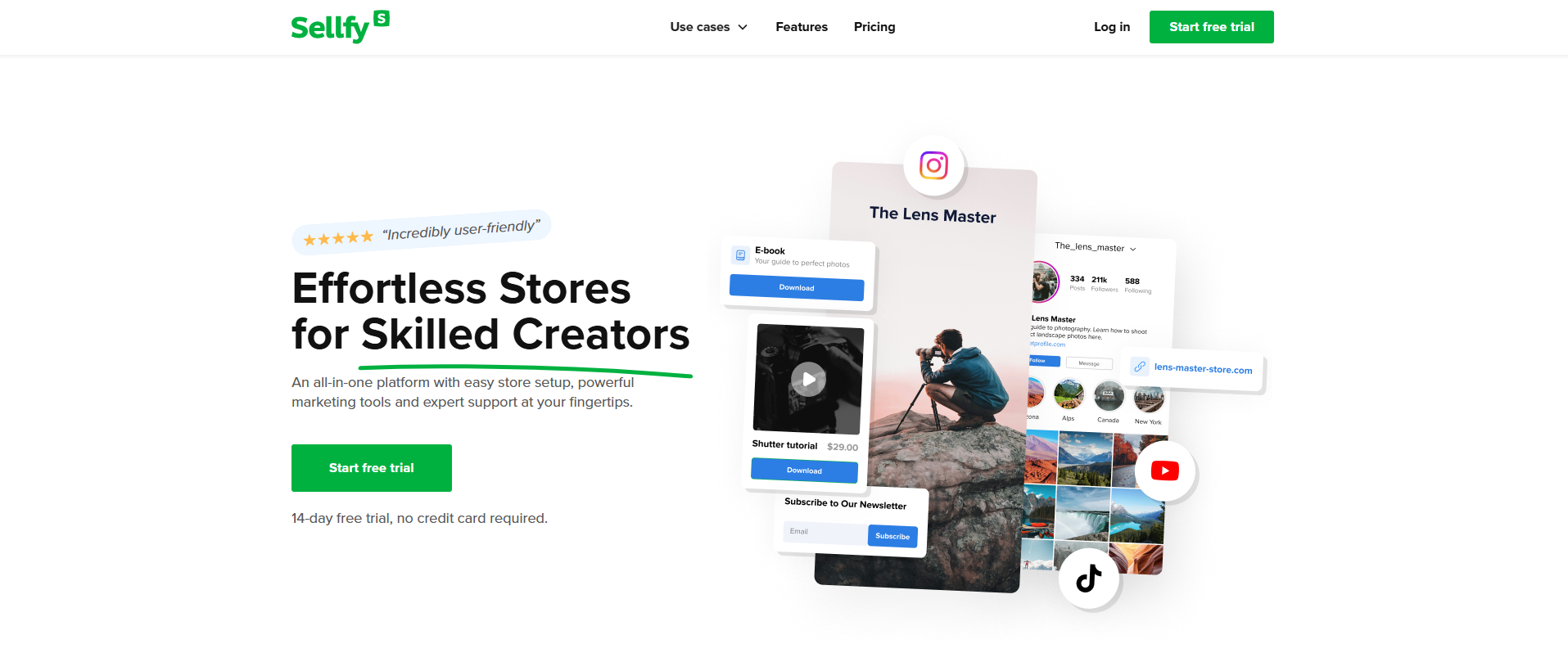
Sellfy is a user-friendly platform for selling digital and physical products with an easy store setup. Perfect for creatives, artists, and those running online businesses, this platform empowers you to sell ebooks, audio tracks, video content, digital designs, and software applications.
With Sellfy, setting up a store takes just a few minutes. Sellfy provides customizable storefronts with built-in hosting. It supports instant product delivery and secure payments. Powerful marketing tools like email campaigns and discount codes are included.
Moreover, it's possible to integrate your product offerings directly into the framework of your website or blog. Sellfy tracks sales and customer data with helpful analytics. It’s a simple solution for selling online with minimal effort.
Key Features
Digital Product Focus: You can sell digital downloads, subscriptions, physical goods, and even print-on-demand products, all from one platform.
Built-in Storefront: Sellfy gives you a fully hosted, customizable storefront so you can launch your shop without any technical setup.
Embedded Checkout: You can place “Buy Now” buttons and product widgets directly on your website or blog, making purchases seamless for your customers.
Secure File Delivery: Sellfy ensures your digital files are delivered safely with features like PDF stamping, download limits, and anti-piracy protection.
Pros
Get a store up and running in minutes without technical skills.
Simple, intuitive dashboard that’s easy to navigate.
Keep 100% of your revenue (on paid plans).
Ideal for digital creators, artists, and merch sellers.
Accept payments in multiple currencies via Stripe and PayPal.
Includes email campaigns, discount codes, and upsell features to boost sales.
Cons
Customization options are more basic compared to platforms like Shopify.
Only a 14-day free trial, then a paid subscription is required.
Better suited for small to medium sellers than high-volume enterprises.
Pricing
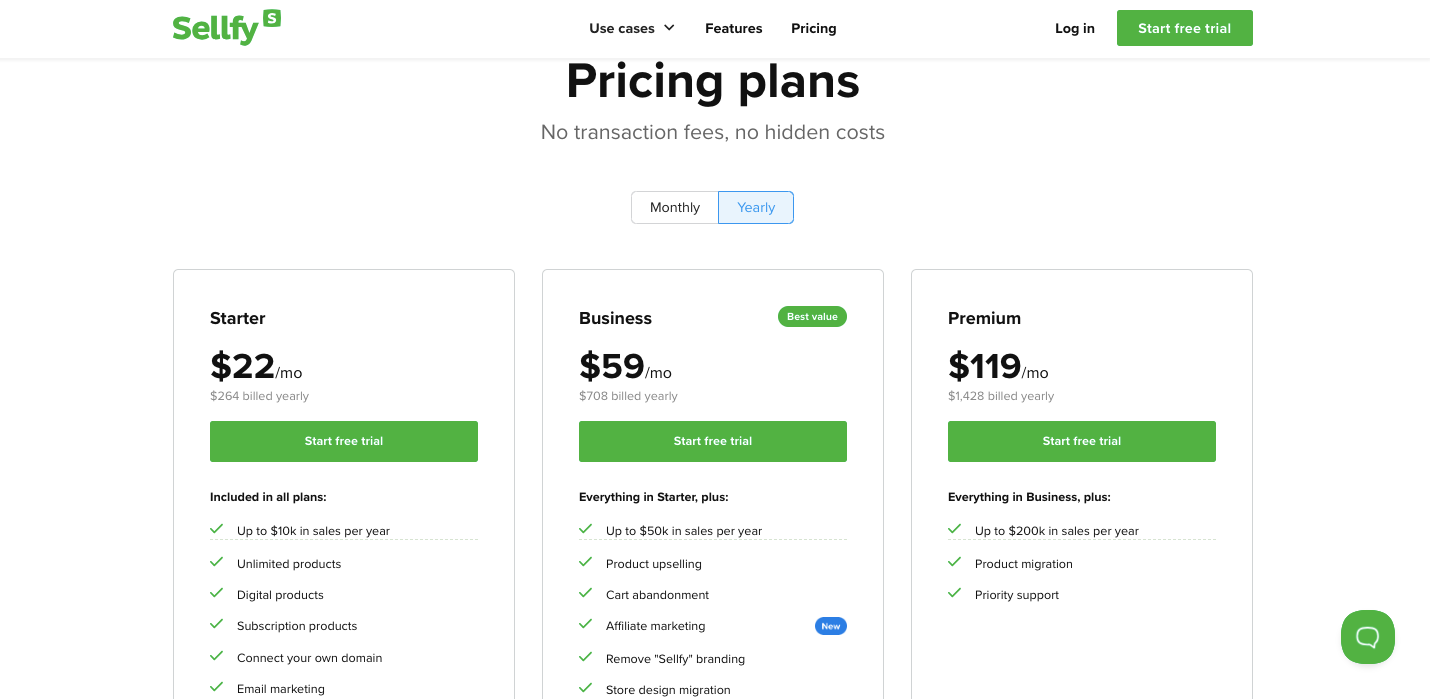
Sellfy offers three pricing plans to sell digital products.
1. Starter: $22/month (billed annually)
2. Business: $59/month (billed annually)
3. Premium: $119/month (billed annually)
10. Payhip (Best For Ebooks, Courses, And Flexible Pricing Models)
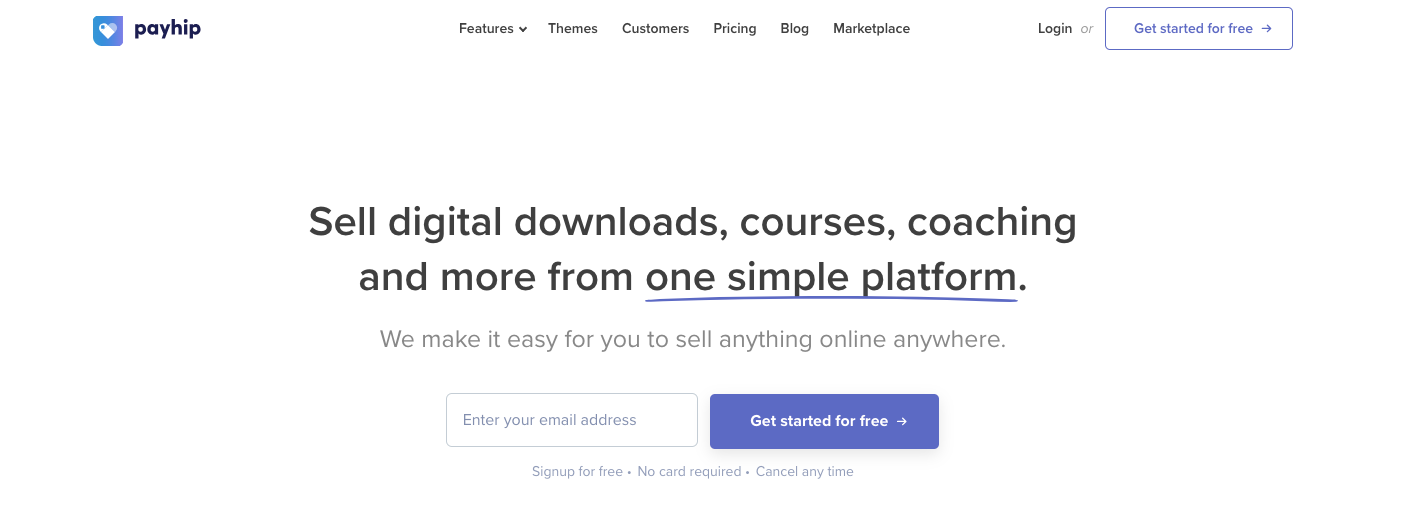
Payhip is an e-commerce platform designed for creators selling digital products, memberships, and physical goods. For those looking into the world of digital sales, whether it's online courses, exclusive content for members, or downloadable resources, its user-friendliness and affordability make it an appealing option.
So, use this option if you’re interested in selling ebooks, design templates, or other similar digital goods.
Key Features
Flexible Pricing: You can choose between Payhip’s free plan with a small transaction fee or go for a paid plan to unlock advanced features like custom domains and lower fees. It’s perfect for beginners or advanced-level creators.
Automated VAT Compliance: Payhip automatically takes care of EU VAT, meaning selling to European customers is a piece of cake in terms of tax compliance.
Integration & Flexibility: It is easy for you to embed Payhip's checkout on your website or share product links with your audience.
Social Discounts: You'll be able to run social-focused discount campaigns on Payhip to encourage social media engagement and increase conversions.
Customized Checkout: You can tailor your checkout page to match your brand and provide a straightforward customer experience.
Pros
Sell various digital products like ebooks, software, design assets, and more.
Begin selling right away without any initial expenses.
Simple interface and user-friendly design make it easy to set up a store without technical skills.
Customize your storefront and add sections and products.
Provide tools to create coupon codes, build mailing lists, and even launch affiliate programs.
Set up and manage your affiliate program with ease, encouraging others to help grow your sales.
Offer PDF stamping and license key generation to protect your digital products from unauthorized sharing.
Cons
Storefronts are customized with limited options.
The function of analytics is relatively primitive.
The 5% transaction fee on the free plan may influence profits. So, for a bigger sales volume, paid plans can be more appropriate.
Pricing

Payhip offers three pricing plans.
1. Free Forever: $0/month (with 5% transaction fee)
2. Plus: $29/month (with 2% transaction fee)
3. Pro: $99/month (no transaction fee)
11. SendOwl (Best For Developers And Software-Based Digital Products)

SendOwl is a steady platform created for promoting and selling digital products. SendOwl focuses on the fast and safe delivery of digital goods, unlike generalist platforms.
It’s a great choice for anyone who already has a website, like a Shopify store owner or an artist who sells their work online, but needs a more dedicated method for selling digital downloads.
Key Features
Secure File Delivery: SendOwl uses strong security measures to protect your files and ensure safe delivery to customers, preventing unauthorized sharing.
License Key Generation: For software or licensable products, SendOwl automatically generates and delivers license keys. This simplifies the process for both you and your buyers, especially beneficial for artists selling design files.
Subscription Management: SendOwl takes care of recurring billing and subscriptions for your online course or member subscriptions.
Cart Abandonment Recovery: If a customer leaves your site with items in their cart, you can send emails as automated reminders for a successful cart abandonment recovery.
Pros
Integrate easily with your own website, including a Shopify store.
Focus on the digital delivery of products in a reliable and secure manner.
Let customers choose their price for a product. Independent artists can use this tool while building their communities.
Your files and customer data are well-protected.
Cons
Not a comprehensive solution for a site; you need an established website to fully use it.
Monthly costs increase with the scale of features and usage.
Does not include the built-in marketing features of all-in-one platforms.
Pricing
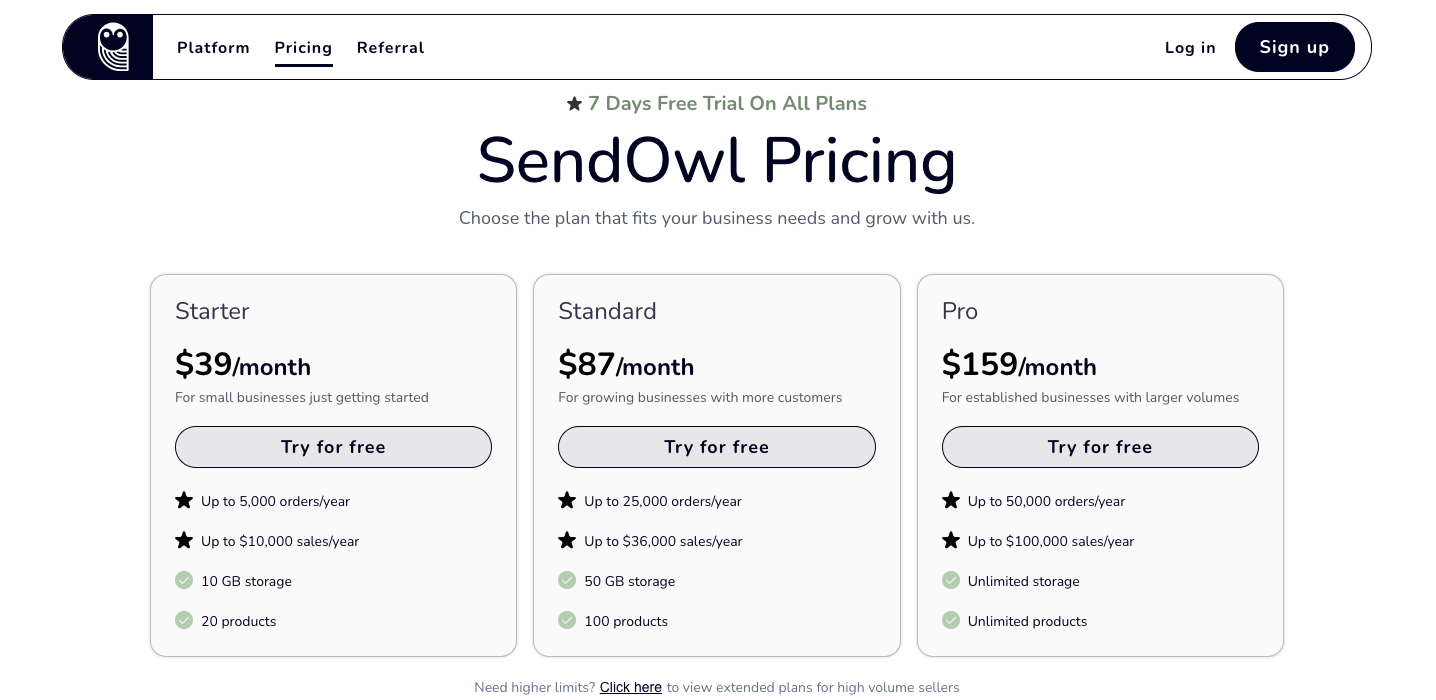
SendOwl offers three pricing plans to sell digital products online.
1. Starter: $39/month
2. Standard: $87/month
3. Pro: $159/month
How to Choose a Platform to Sell Digital Products
Here are some important key aspects you need to consider before choosing a platform to sell your digital products-
Cost and Fees: Look beyond the base price- check for transaction fees, paid add-ons, and marketing tool costs.
Ease of Use: Pick a platform that matches your tech skill level, whether you're a beginner or more advanced.
Product Compatibility: Make sure the platform supports the kind of digital content you’re selling, like courses, downloads, or subscriptions.
Marketing Tools: A good platform should help you promote your products with built-in marketing tools or easy integrations.
Tool Integration: If you're already using apps like Shopify, email software, or CRMs, check that the platform works well with them.
Choosing the right platform is key to starting and scaling your digital product-selling business.
You can explore popular digital products selling platforms like EzyCourse, Shopify, and Etsy, or flexible tools like Gumroad and SendOwl. Each of them has its own set of strengths.
The right choice depends on your goals, target audience, and workflow.
What Makes EzyCourse the Best Platform to Sell Digital Products?
EzyCourse stands out as the best platform for selling digital products. It offers an all-in-one solution with a user-friendly interface and unlimited features. Creators can easily build courses, memberships, communities, and more.
The platform includes tools like email marketing, affiliate programs, and real-time advanced traffic analytics. The analytics help track unique users, page visits, and purchase details.
EzyCourse simplifies everything by combining website building, course creation, and community tools in one place. This saves users from managing multiple platforms and reduces time and cost.
The drag-and-drop website builder is perfect for beginners. It lets anyone create a professional online store or course site without technical skills.
EzyCourse includes features like group chats, video libraries, live streaming, appointment scheduling, surveys, and more. These tools help you deliver your products or content, engage your audience, and grow communities.
The platform supports different monetization options including selling courses, memberships, digital products, and more. This flexibility helps you reach broader audiences and create multiple income streams.
EzyCourse is also affordable, making it easy for you to start without a big investment. So, this is a top choice for selling digital products as it combines ease of use, powerful tools, flexible monetization, and cost-effectiveness.

FAQs
What is a digital product?
A digital product is any item or service that is created, sold, and used in a digital format. It doesn’t have a physical form and is typically delivered electronically. Digital products can only be downloaded or accessed online.
They’re often scalable and cost-effective to distribute. Examples include ebooks, software and apps, online courses, audio or video files, digital arts or templates, website themes or plugins, etc.
How do I start selling digital products?
You can start selling digital products following the steps below:
Choose your digital products you want to sell
Develop your digital product
Set up your online store or use a platform that supports digital product sales
Use marketing strategies to promote your products
Launch your product and begin generating sales and income
Is EzyCourse the best platform for selling digital products?
Yes, EzyCourse is an all-in-one platform that has no transaction fees. The platform has readily available templates that you can use to start your website to sell digital products online. You may also consider Shopify as your business grows.
Where can I host my digital downloads?
The best places for hosting digital downloads are EzyCourse, Sellfy, Shopify and Gumroad.
What kind of digital products sell best?
The best-selling digital products include online courses, stock images, audio and video files, ebooks, templates, graphic designs, licensed software, and PDF files.
Wrapping Up
Hope this article helped you find the best platforms to sell digital products in 2026. The right platform ultimately comes down to your specific business needs. Carefully consider the types of digital products you plan to sell, be it courses, ebooks, memberships, or a combination, as well as the features, pricing structures, and marketing strategies that align with your goals.
If you’re ready to start selling digital products, you can try EzyCourse now with a 30-day free trial to make money online by selling digital products.

![10 Best Platforms to Sell Digital Products [2026 Update + Comparison]](https://f.ezycourse.net/2422/cmac7qru604cyls8zfabd2e1w.png)




